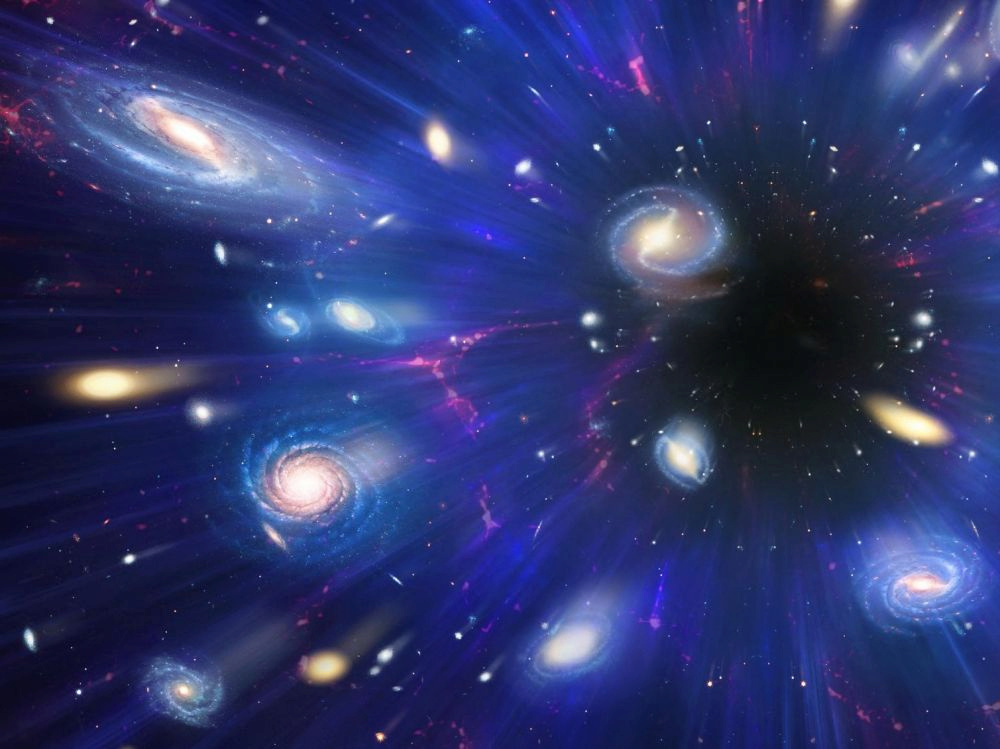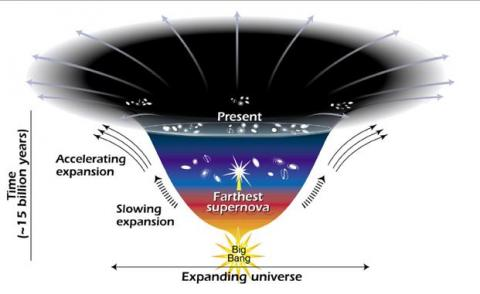?What is dark energy, or dark energy, that is accelerating the expansion of the Universe

It constitutes the bulk of the content of the Universe and accelerates its expansion… “What is the nature of dark energy, or dark energy?” asks a reader on our Facebook page. This is our question of the week.
"What is the nature of the dark energy that drives the cosmic acceleration?" , asks us Cristina Barrella Penna on our Facebook page . This is our reader question of the week. To answer this, we invite you to (re)discover in full below our article "Dark energy, dark engine of the cosmos" from the magazine Les Indispensables de Sciences et Avenir n°209 (dated April/June 2022).

Dark energy acts on cosmic expansion, an idea that dates back to 1998
Each cubic centimeter of vacuum contains, by the mere fact of existing, a certain quantity of energy, specific to space itself. At least that is what the current standard model of cosmology postulates. An energy, certainly, very, very low: a cubic kilometer of empty space does not contain quite enough to boil a drop of rain... But to paraphrase the British writer Douglas Adams, author of The Hitchhiker's Guide to the Galaxy , "space is big", big enough so that this energy, uniformly present in its immense volume, represents a little more than double the energy contained in matter, whether black or ordinary. The effect of this so-called "dark" energy - for the sole reason that we do not know its nature - is to accelerate the cosmic expansion.
This strange idea took hold in 1998, when two teams, led respectively by Australian Brian Schmidt and American Saul Perlmutter, announced that supernovae that had exploded nearly 8 billion years ago appeared less bright and therefore further away than expected. Until then, astronomers were convinced that the expansion of the Universe had slowed steadily since the Big Bang, due to the gravitational attraction exerted by galaxies on each other - as well as a An object thrown up loses speed as it moves away from the Earth.
Gravitational attraction versus repulsive gravity
However, studies on supernovae seemed to mean that during the last third of cosmic history, the expansion of the Universe had stopped slowing down and started, on the contrary, to… speed up! As if a ball launched into the air was suddenly blown into space by a mysterious force. The most immediate explanation - already postulated by Einstein - amounted to admitting the presence in space of a constant "vacuum energy", exerting a repulsive gravity. According to this hypothesis, as long as the Universe was sufficiently dense (roughly, twice as small as today), the gravitational attraction exerted on itself by matter slowed down, as it should, the expansion. But as the Universe grew, its content was diluted. It was thus only a matter of time before the density of matter fell below that - constant, therefore - of this "vacuum energy", and repulsive gravity took over.
Moreover, several observations had shown, from the 1990s, that on a very large scale, space is "flat" (which simply means that it obeys the rules of Euclidean geometry). Indeed, the cosmic radiation background - the microwave image of the young Universe which lines the bottom of the sky - would be deformed, as if by a sort of magnifying glass effect, by the volume of space which separates, if the latter was curved. However, this is not the case… The problem, until the announcement of Schmidt and Perlmutter, is that by counting all the ordinary matter that we knew to be present in the Universe and all the dark matter whose existence we suspected, we never obtained more than a third of the mass necessary for the Universe to be spatially flat.

Since then, numerous observations have confirmed the existence of this dark energy… without us understanding its nature. "There are several hypotheses , explains Sandrine Codis, astrophysicist at the CNRS. One possibility is that it is an authentic 'vacuum energy' - but that no longer convinces almost anyone." The reason is that if, as we said, a model postulating a constant energy intrinsic to the vacuum gives excellent empirical results, theoretical physics fails to explain its value: in particle physics, "the vacuum energy" should be either infinite, or more likely strictly zero, but nothing justifies that it is actually 0,
Many scientists therefore prefer to imagine that the vacuum does not have energy on its own, but contains another field whose behavior would be almost that of vacuum energy: "A kind of fluid which would permeate space and would have a slightly different equation of state", adds Sandrine Codis. By "equation of state", astrophysicists express, in broad outline, the way in which a substance is diluted as cosmic space extends. So, for example, an energy intrinsic to each cubic centimeter of space does not dilute at all with expansion (when you add cubic centimeters to the Universe, you add as much vacuum energy). But the other possibility, an energy field - sometimes called "quintessence" - which would dilute just very little would play a similar role. "Needless to say that at the moment, theoreticians are having a field day and regularly coming up with models, almost all of them more outlandish than the other!" , laughs the researcher.
"The years pass and the problems remain"
How to decide? The current cosmological model is content to postulate a constant energy, which is sufficient for it to best agree with all observations. But we can refine these. It turns out that the way large structures - galaxies and clusters - grow over time is very sensitive to the exact recipe for the contents of the Universe. And that mapping the deep Universe on a large scale makes it possible to study its evolution in detail. Will a study of this evolution reveal more fickle dark energy behavior than the current model ascribes to it?
This would perhaps allow us to guess its nature. "This is, for example, the objective of the Euclid mission. But there are others, such as large censuses carried out from Earth , enthuses Sandrine Codis. Missions that are all the more necessary since several years, tensions in the cosmological model regarding the rate of expansion, or contradictions between different measures of the amount of matter in the Universe."

These contradictions could simply be the result of biases produced by the measurement method. "But the years go by and the problems remain , worries Sandrine Codis. It could therefore be that the model is too simplistic." Some theorists think that the apparent acceleration of the expansion could be only a local phenomenon, due to the fact that we live in an abnormally sparse bubble of the Universe which would therefore expand a bit faster than the rest. : as we observe these distant regions, of normal density, as they once were, this would create the illusion that the Universe has started to accelerate recently… An idea which has however only given unsatisfactory results until 'here. In any case, the key lies in these future maps of the deep Universe. "The whole community is very impatient to receive the data that will come in the next few years!", concludes Sandrine Codis.
Source: websites

